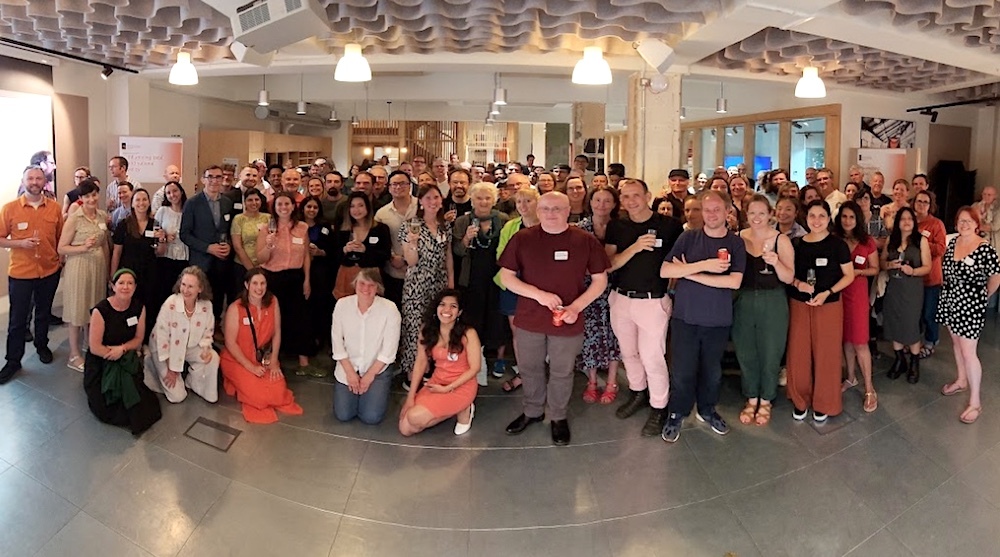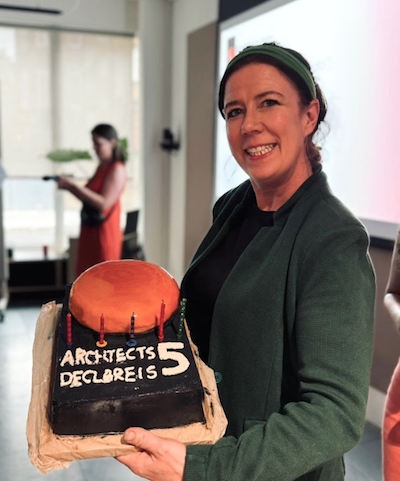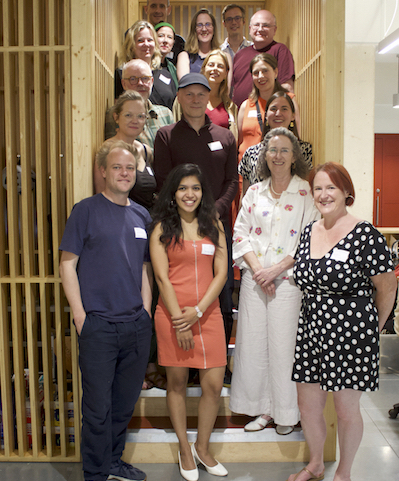News
For latest updates on UK Architects Declare, please also follow us on BlueSky, Instagram and LinkedIn
We're recruiting: AD Student Ambassador
As we mark our first five years and plan for our next period of work, we want to ensure AD’s approach is informed by and remains relevant to a wide range of current and emerging thought on architecture’s place in tackling the planetary emergency.
We're therefore recruiting a student ambassador who
can draw on their learning in academia and in practice and their knowledge of student architectural
networks. They will help shape our thinking, how we engage with different audiences, who we collaborate
with, what support we offer signatories, and where we can best intervene to change the systems
that perpetuate a degenerative built environment to ones that promote regenerative policies and
actions.
They will join the Steering Group as a non-voting member for a fixed term. Like all our SG members, this is a voluntary position.
See our Student Ambassador role description for full details. We welcome applications from all backgrounds, including underrepresented groups.
Deadline for applications: 20th September.
29 August 2024
Celebrating our 5th Birthday!
We were excited to have over 120 people join us and our hosts HaworthTompkins on 24th July to celebrate UK Architects Declare's first five years.
Around 80 organisations were in the room to celebrate how far we've come together over the past five years, including signatory practices and partners in our programme to move the built environment to address the planetary emergency. The energy, dedication and creative thinking to drive our collaborative action forwards is more prevalent than ever.

Members of our Steering Group shared their insights from AD's inception in 2019 and impetus to bring the sector together around our declaration points for systems change, the successes in producing our Practice Guide and Practice Action Masterclasses, and our more recent achievements with the Regenerative Design Guide, Regenerative Architecture Index and Building Blocks manifesto for transformative built environment policies.
Tom Gibson, one of our new Steering Group members, welcomed us to HaworthTompkins. Michael Pawlyn, AD's co-instigator alongside Steve Tompkins, told everyone how "Five years ago hardly anyone was talking about regenerative design, and now everyone is. That’s something we’ve all created together - the potential for architects to reclaim our agency as shapers of the future, as integrators and systems thinkers.”
Zoe Watson said "I think everyone in this room can be extremely proud of the community we’ve grown together and the collective action we have taken over the past 5 years"
Deepthi Ravi, one of our newest Steering Group members, painted a picture of our future focus: "Let’s embrace and transform the built environment that we all work with for 2030, and do it such that we plan, construct and operate within planetary boundaries.."
Julia Barfield led us in a toast to AD's programme and partners, and Carrie Behar reminded us of all the people and organisations who have made AD a success and whose support is fundamental to our work - and of the opportiunities to support us through a financial donation or to get involved in our work. Over the years, AD has worked closely on publications and events with many partners, including the RIBA and ACAN!, with an array of organisations on our Building Blocks policy work, and most recently with Architecture Today to launch the Regenerative Architecture Index - which will announce its first year's results in September.
Carrie then guided us through a short discussion, asking guests to become gather in the corners of the room designated with AD's key themes, according to where they think we should focus our activity - 'influencing local and national policy', 'supporting signatory practices', 'advocating for industry change', and 'something else' that they wished to propose for us.
Our Plan for Change sets out our approach to supporting signatories and demonstrating where leadership can replace the system that has created the climate and biodiversity emergency with one that builds a better future for us all.
Thank you to everyone at HaworthTompkins for all their help organising this special event, making us welcome at their offices - and making a special cake! - and all who made this such a great evening!



9 August 2024
Open letter to candidates for election to RIBA President
UK Architects Declare has today sent the following Open Letter to Chris Williamson, Funmbi Adeagbo, Duncan Baker-Brown - candidates in the current election to the position of Presdient of the RIBA (copied to the current President, Muyiwa Oki):
The election of a new President of the Royal Institute of British Architects comes at a time of heightened awareness of the scale and scope of the planetary emergency and the significant contribution our built environment makes to furthering the crisis. Now is also a time of unprecedented opportunity for architects and those we work with to take real action to solve these deeply rooted problems.
UK Architects Declare supports practices in transitioning to regenerative design and in demonstrating where the systems that govern how our built environment performs can be changed, moving us away from continued degenerative actions to a positive future for all. Our vision for our sector’s part in tackling the emergency is bold: “A built environment planned, constructed and operated within planetary boundaries to deliver environmental justice and to support the flourishing of all life for all time.”
We are proud to have worked closely with the RIBA on important steps on this journey. Our joint Built for the Environment report and summit ahead of the COP26 global conference in Glasgow in 2021 showed the opportunities for the UK to lead. More radical and systemic change is required, with the greatest action needed at the highest leverage points involved in changing any system:
- The mindset or paradigm out of which the system - its goals, power structure, rules, its culture - arises.
- The goals of the system.
- The distribution of power over the rules of the system.
- The rules of the system (incentives, punishments, constraints).
- Information flows.
- Material flows and nodes of material intersection.
- Driving positive feedback loops.
It is here that key institutions such as the RIBA must lead. RIBA has a central role in how our profession adapts to our changing reality and leads the urgent transition we need. Putting it simply, what would it look like if RIBA maximised its agency on the planetary emergency?
We call on all candidates for this new term of office to engage clearly and directly with the following policies as the driving force for the RIBA’s actions on the planetary emergency in the short, medium and long terms:
1. The mindset or paradigm out of which the system — its goals, power structure, rules, its culture — arises.
- Redefine the RIBA’s definition of the purpose of the profession to include addressing the climate and biodiversity emergency and designing within planetary limits.
- Collaborate with other professional institutions to demand of Government the systems changes necessary to safeguard the future and address climate justice. These include the following 4 points:
- Join the Wellbeing Economy Government Partnership (alongside Scotland and Wales) to prioritise wellbeing over GDP and adopt the maximisation of planetary health as the primary purpose driving our economy.
- Implement a Better Business Act to impose a duty to wider stakeholders including the living world as to require a clearly stated purpose for all companies.
- Move towards Doughnut Economics, to utilise the built environment to bring all UK citizens above the social foundation while staying within planetary limits.
- Implement a Wellbeing of Future Generations Act as proposed by Lord Bird and the UN.
2. The goals of the system
- Align all RIBA awards with the redefined purpose of the profession, as above.
- Expand the RIBA Architecture 2030 scheme to align with leading regenerative thinking.
3. The distribution of power over the rules of the system
- Appoint an advisor on regenerative design (reporting directly to the President).
- Create a standing Ethics committee to advise the board on decision-making, and put forward annual debates (similar to RICS Harris Debates).
4. The rules of the system (incentives, punishments, constraints)
- Accelerate and widen engagement with a campaign on the regulation of function in the UK where there is a “strong public interest that the professional function of the architect should be regulated and key activities reserved to qualified and competent professionals.”
- Empower the professional standards team to interface with practices more readily, by both visiting and promoting practices who demonstrate best practice as well as visiting and investigating practices reported for not meeting the code.
- Revisit the code of conduct and practice, and engage broadly with students and practitioners on the efficacy of the current code as well as perceived and actual accountability under it.
5. Information flows
- Organise an extensive programme of lectures, workshops and training featuring leading experts on how to address the planetary emergency through supporting innovation in products or workflows for sustainable or regenerative construction.
6. Material flows and nodes of material intersection
- Review sponsorship deals through an ethical/sustainable lens.
7. Driving positive feedback loops
- Share open access data on the RIBA 2030 Challenge.
UK Architects Declare stands ready to work with and support the RIBA and its President in enacting change at these levels, including calling on others in the profession, the built environment sector and governments across the UK to identify and bring about complementary systems change. We will also continue to develop the practical initiatives - such as our Regenerative Architecture Index (with Architecture Today), our Regenerative Design Primer and Practice Guide - to support architectural practices as we help to build a better future, and welcome opportunities to work with the RIBA on these.
From the UK Architects Declare Steering Group:
Alasdair Ben Dixon, Anna Lisa McSweeney, Anna Pamphilon, Anna Woodeson, Carrie Behar, Chloe van Grieken, Craig Robertson, Deepthi Ravi, Julia Barfield, Kevin Logan, Laura Baron, Mandy Franz, Michael Pawlyn, Tom Gibson, Tom Greenall, Zoe Watson
6 June 2024
Deadline Extended for Regenerative Architecture Index
We're encouraged by the number of people who have begun registering to join the innovative Regenerative Architecture Index scheme with Architecture Today! But we appreciate that it's a process to complete the application, involving discussions across a practice's team. We've therefore agreed with Architecture Today to extend the deadline by a week to Friday 24th May.
It's also been good to see questions coming in as people explore what the Index involves. For example, do you need to be able to answer all the questions? No!
The Index captures good practice across many aspects of a business's approach to regenerative design in its policies as well as its projects. With a set of 19 questions in all, we do not expect all applicants will be delivering across every facet of our three core principles of Being a Good Ancestor, Co-evolving with Nature and Creating a Just Space for People. As such, it is not necessary to be able to answer every question in the application, and we expect there to be gaps. Having said that, we're also interested in the problems that practices encounter as they explore regenerative design, as well as their achievements.
The over-arching aims of the Index are to share knowledge and to support organisations making real efforts to incorporate regenerative thinking into their practices and projects. The Index won't be ranked 'top to bottom' in the conventional way, but will highlight practices that have performed well on each individual question, with examples where appropriate. From this, we will end up with a compendium of best practice, rather than a conventional ranking table. The Index will also anonymously highlight barriers, challenges and obstacles to help learning across the sector.
The Index is open to all organisations involved in the design of our built environment, and we welcome entries from beyond the UK.
As well as the Index, UK Architects Declare has also recently launched our first Regenerative Design Primer to help organisations explore and implement the principles of this transition to design with a positive impact.
16 May 2024
Recruiting new Steering Group members - deadline for applications extended
We've extended the deadline for new vacancies on our Steering Group to Friday 8th March 2024.
We are keen to recruit new members from among our signatories, reflecting the diversity of practices as we develop AD’s programme. Our Steering Group are all volunteers and actively lead on many aspects of our work through small SG groups as well as full Steering Group meetings.
New members will contribute to the full range of the Steering Group’s discussions and decisions. It's a great opportunity to get involved in our busy work programme! You can find out what's involved and how to apply in our Role Description.
29 February 2024
Building Blocks to Transform the Built Environment: 'early adoption policies' briefing document
UK Architects Declare has been working hard with partners to finalise our policy document, Building Blocks to Transform the Built Environment, for its Parliamentary launch on 12th March. Key industry voices will be joining MPs and Lords to hear about and discuss the policy priorities in AD's manifesto for the next UK Government.
A 1-page briefing document, highlighting key 'early adoption policies' in the manifesto, has been endorsed by a range of industry bodies. AD will be presenting these at ACAN's stand (D40) at Futurebuild on 6th March: Come along to find out more!
28 February 2024

Entries are open for the inaugural Regenerative Architecture Index
UK Architects Declare and Architecture Today have launched the world’s first Regenerative Architecture Index.
Benchmarking participating practices on their regenerative policies, actions and working practices, the Index aims to share best practice, celebrate success, raise awareness across the wider construction sector and act as a catalyst for regenerative practice across the industry. We will also use the initiative to identify obstacles to progress, encourage knowledge sharing and identify tools, methods or policy measures required to support the transition to a low-carbon, high well-being and resilient future.
AD will also very soon be publishing a free Regenerative Design Primer. Complementing our 2021 Practice Guide (and replacing its short chapter on regenerative design), this Primer will support practices participating in the Index - and all built environment designers looking to make this transition.
The Index asks participants about their practice and its projects under three broad headings:
Part 1: Being a good ancestor.
This is about a shift in practice mindsets to consider truly long-term thinking. Our decisions today should consider seven generations ahead, ensuring adaptability and flexibility for the future. This requires innovative thought, as current models are rarely beneficial in the long term.
Part 2: Co-evolving with nature.
This is about recognising that we are part of nature, within integral living systems, not separate from it. Our work should actively regenerate ecosystems by learning from and working with natural systems. This requires designing for circularity and encouraging closed-loop energy, material and water cycles.
Part 3: Creating a just space for people.
This is about providing social connection, economic opportunity and wellbeing for all. Our design processes should foster a shared sense of stewardship where neighbourhoods can self-organise and build their resilience. This requires ethical, inclusive and participative approaches.
The deadline for entries is Wednesday 17th May.
The results will be published in September 2024 in a special issue of Architecture Today and on the Architecture Today website.
27 February 2024
Statement on Labour's reversal on its Green Investment pledge
Responding to the recent announcement by the Labour Party reversing its pledge to invest £28 billion annually on investment to combat the climate and biodiversity emergency, the Steering Group of UK Architects Declare today said:
"We are deeply disappointed by Labour’s recent decision to scale back investment in a safer future. This is a massive missed opportunity to show true climate leadership at a time in history where it matters most. The tragedy is that there are a plethora of solutions that could solve our planetary emergency, whilst also bringing about greater social justice. The Climate Change Committee has estimated that up to 725,000 jobs could be created in the low carbon sector, proving that greater investment makes both scientific and economic sense for the long term.
"We are hopeful that there are still some courageous voices within parliament, and we encourage them to speak out against the short-sighted mindset that is driving the destruction of the living world. As UK Architects Declare we remain committed to shaping a positive future and will be presenting our ‘Building Blocks’ policy manifesto at Portcullis House on the 12th of March. We encourage our signatories to write to their local MP to invite them along.
"We agree with Muyiwa Oki, President of the RIBA, who recently said of this announcement that, with the climate emergency intensifying, urgent national action is needed: ‘Ambitious and sustained investment from whomever forms the next Government, and the private sector, will be critical to address the scale of this challenge. ... Act now, or future generations will pay the price.’"
13 February 2024
UK Architects Declare seeks volunteers to expand our working groups
We plan and deliver our activities through small working groups, with Steering Group members and other volunteers from across our signatory practices and beyond. These are mostly ‘task & finish’ groups, typically working over periods of a few months up to a year.
We now wish to expand our groups with suitable volunteers. Please get in touch if you would like to be involved in any groups below! Skills you might contribute could include research, drafting, graphics & design, proofreading, building networks, and promotion - among many other ways to support us. You can find details in our Call Out.
7 February 2024
AD is seeking new members to expand our Steering Group!
We have new vacancies on our Steering Group and are keen to recruit new members from among our signatories, reflecting the diversity of practices as we develop AD’s programme. Our Steering Group are all volunteers and actively lead on many aspects of our work through small SG groups as well as full Steering Group meetings.
New members will contribute to the full range of the Steering Group’s discussions and decisions. It's a great opportunity to get involved in our busy work programme! You can find out more of what's involved and how to apply in our Role Description.
31 January 2024